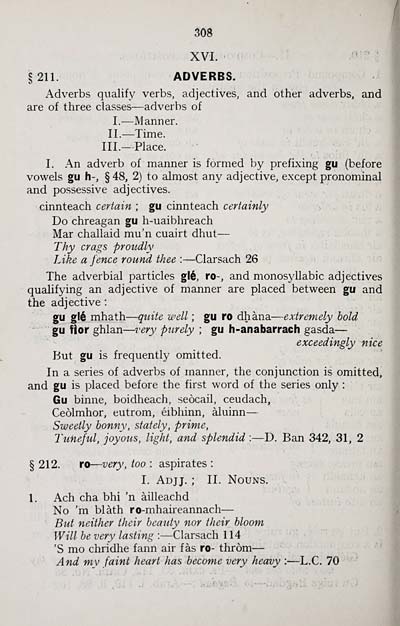Matheson Collection > Gaelic grammar, containing the parts of speech and the general principles of phonology and etymology, with a chapter on proper and place names
(328)
Download files
Complete book:
Individual page:
Thumbnail gallery: Grid view | List view

308
XVI.
§211. ADVERBS,
Adverbs qualify verbs, adjectives, and other adverbs, and
are of three classes — adverbs of
I.^ — Manner.
II.— Time.
Ill.-Place.
I. An adverb of manner is formed by prefixing gu (before
vowels gu h-, § 48, 2) to almost any adjective, except pronominal
and possessive adjectives.
cinnteach certain ; gu cinnteach certainly
Do chreagan gu h-uaibhreach
Mar challaid mu'n cuairt dhut —
Thy crags proudly
Like a fence round thee : — Clarsach 26
The adverbial particles glè, ro-, and monosyllabic adjectives
qualifying an adjective of manner are placed between gu and
the adjective :
gu glè mhath — quite well ; gu ro dhàna — extremely bold
gu fior ghlan — very purely ; gu h-anabarrach gasda —
exceedingly nice
But gu is frequently omitted.
In a series of adverbs of manner, the conjunction is omitted,
and gu is placed before the first word of the series only :
Gu binne, boidheach, seòcail, ceudach,
Ceòlmhor, eutrom, eibhinn, àluinn —
Sweetly bonny, stately, prime.
Tuneful, joyous, light, and splendid : — D. Ban 342, 31, 2
§ 212. ro — very, too : aspirates :
I. Adjj. ; II. Nouns.
1. Ach cha bhi 'n àilleachd
No 'm blàth ro-mhaireannach —
But neither their beauty nor their bloom
Will be very lasting : — Clarsach 114
'S mo chridhe fann air fas ro- thròm —
And my faint heart has become very heavy : — L.C. 70
XVI.
§211. ADVERBS,
Adverbs qualify verbs, adjectives, and other adverbs, and
are of three classes — adverbs of
I.^ — Manner.
II.— Time.
Ill.-Place.
I. An adverb of manner is formed by prefixing gu (before
vowels gu h-, § 48, 2) to almost any adjective, except pronominal
and possessive adjectives.
cinnteach certain ; gu cinnteach certainly
Do chreagan gu h-uaibhreach
Mar challaid mu'n cuairt dhut —
Thy crags proudly
Like a fence round thee : — Clarsach 26
The adverbial particles glè, ro-, and monosyllabic adjectives
qualifying an adjective of manner are placed between gu and
the adjective :
gu glè mhath — quite well ; gu ro dhàna — extremely bold
gu fior ghlan — very purely ; gu h-anabarrach gasda —
exceedingly nice
But gu is frequently omitted.
In a series of adverbs of manner, the conjunction is omitted,
and gu is placed before the first word of the series only :
Gu binne, boidheach, seòcail, ceudach,
Ceòlmhor, eutrom, eibhinn, àluinn —
Sweetly bonny, stately, prime.
Tuneful, joyous, light, and splendid : — D. Ban 342, 31, 2
§ 212. ro — very, too : aspirates :
I. Adjj. ; II. Nouns.
1. Ach cha bhi 'n àilleachd
No 'm blàth ro-mhaireannach —
But neither their beauty nor their bloom
Will be very lasting : — Clarsach 114
'S mo chridhe fann air fas ro- thròm —
And my faint heart has become very heavy : — L.C. 70
Set display mode to: Large image | Transcription
Images and transcriptions on this page, including medium image downloads, may be used under the Creative Commons Attribution 4.0 International Licence unless otherwise stated. ![]()
| Permanent URL | https://digital.nls.uk/76603789 |
|---|
| Description | Items from a collection of 170 volumes relating to Gaelic matters. Mainly philological works in the Celtic and some non-Celtic languages. Some books extensively annotated by Angus Matheson, the first Professor of Celtic at Glasgow University. |
|---|
| Description | Selected items from five 'Special and Named Printed Collections'. Includes books in Gaelic and other Celtic languages, works about the Gaels, their languages, literature, culture and history. |
|---|

